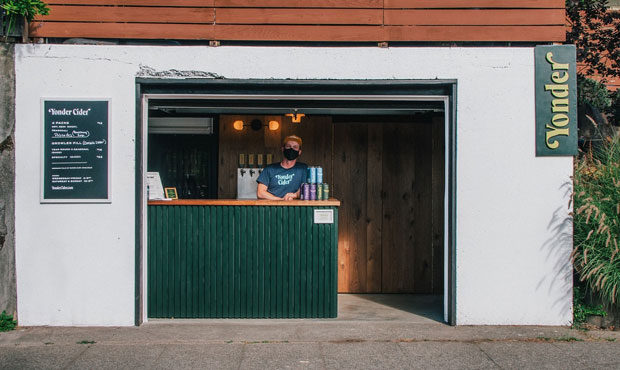Popular community small business authorized to remain open up just after Seattle council loosens land use regulations

Greenwood’s Yonder Cider. (Picture courtesy of Yonder Bar)
Seattle councilmembers approved legislation Monday, loosening a series of land use rules imposed on corporations working out of houses.
Seattle aims to loosen land use guidelines right after Yonder Cider closure
The legislation arrived partly in reaction to the compelled closure of a common Greenwood small business termed Yonder Bar, which had been offering cider to go in cans and growlers. Yonder operated out of Caitlin Braam’s garage for seven months right before a neighbor’s regular problems to the Wellbeing Division and Liquor Regulate Board bought it shut down. At the time, the neighbor pointed out that working a company that marketed alcoholic beverages out of a residence blocks absent from a college violated Seattle’s current land use codes.
After Councilmember Dan Strauss released his “Bringing Small business Home” proposal — which sought to rest individuals codes — Braam was notified by the city’s Section of Design and Inspection that she was authorized to reopen, but would have to shut down forever if the legislation unsuccessful to move.
If she experienced been pressured to remain closed until the monthly bill passed, she would have had to wait around till its effective date on April 15 to start running once again.
On Monday, “Bringing Business Home” handed by an mind-boggling 8-1 margin, with Councilmember Alex Pedersen operating as the lone “no” vote. The invoice will only be in spot for a 12 months, in hopes of furnishing an “even participating in field” for corporations like Yonder Cider above the class of the pandemic.
Why Seattle entrepreneur is opening new coffee store all through pandemic
Preceding land use codes had essential corporations operate out of homes to have shoppers pay a visit to by appointment only, and to have “no evidence of the dwelling profession visible” from the exterior, with no much more than two personnel who are not also residents of the property by itself.
“Many of our most profitable companies were being born out of garages,” Councilmember Stauss claimed Monday soon following the bill’s passage. “We have to have to guidance entrepreneurs, furnishing them the adaptability to operate out of their garages and increase into vacant storefronts.”
Councilmember Alex Pedersen outlined his opposition to the evaluate in a website article very last 7 days, saying that he was “disappointed this bill was rushed to the whole Town Council,” and that it “could do far more damage than good” to tiny corporations in Seattle. He also mentioned that the monthly bill appeared to mostly be inspired by an e-mail marketing campaign launched by Braam, “rather than organically arriving from a various or citywide exertion.”
“While it’s probable there are some aspiring home enterprise that could profit, I do not assume it’s appropriate to make citywide land use changes based on anecdotes or conjecture,” Pedersen stated.
Braam praised the laws soon after it was passed out of committee previous 7 days.
“We appreciate the Town Council’s openness and ahead considering on this topic,” Braam explained Monday. “Starting a little small business – COVID or not – is challenging and it is high priced. Permitting modest firms to properly and securely operate out of their homes not only frees them of the money load and worry that appear with prolonged-phrase industrial leases, it offers them a probability to be a vibrant and contributing component of their group.”







